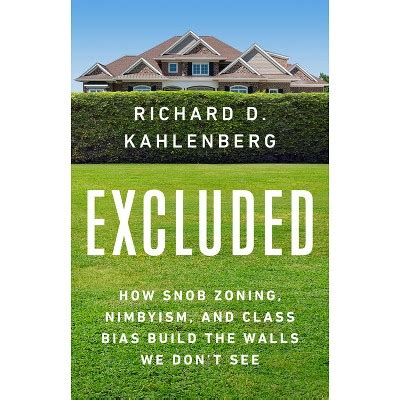Tall Fences, Happy Neighbors and Unhappy Communities
Richard H. Kahlenberg is an idea machine, a writer on public policy who offers new and challenging takes on difficult problems. He has written on higher education, schools, affirmative action, teachers unions and more through books, journals and articles. A graduate of Harvard, college and law, his curiosity and desire for a fairer, more just America, drives his work. Kahlenberg’s latest effort, Excluded: How Snob Zoning, Nimybism, and Class Bias Build the Walls We Don’t See is provocative examination of one of the country’s most intractable issues: fair housing. Overflowing with observations, ranging from history to policy to economics to anecdote, the book makes a compelling argument that the problems surrounding housing are much deeper, and influential, than most realize. It had me thinking about housing in America in different ways.
How might one think about and explain housing in the US? Focus on a city, a neighborhood, or region? Some scholars do comparison analyses while others look to explore policy, framing high-level issues and contrasting that with what happens locally, in a particular city or neighborhood. Complicating the question, there are many different housing policies and practices, as well as local histories of housing, throughout the country. The topic is so large that definitions and boundaries inherently complicate the work and potential understanding. In Excluded, Kahlenberg’s focus is on exclusionary zoning and its impact. He argues that exclusionary zoning is discriminatory and causes great harm, possibly even more than sexism and racism. Zoning determines who lives where. That has tremendous consequences, shaping opportunities, jobs, education, health care, quality of life and even length of life. We all know that poverty, a seemingly intractable problem, is concentrated in geographic areas. Kahlenberg stresses in this book that those concentrations are the result of political policy choices, often expressed through zoning policy.
Excluded, though, is not just a policy study. It shares the stories of people, families, and the effects of housing on their lives. It may sound basic, yet it is vital to underscore this point. Where one lives dictates so much, shaping and framing the boundaries of a life.
The book is not only interested in those that are excluded. On the flip side, those that have been able to secure housing have seen tremendous economic benefit, particularly in the past fifty years. The book underscores how zoning, tax policy and other imposed limitations on housing have driven up prices and will continue to do so. Kahlenberg reminds up that it was not always so in the United States. Decades ago affordable housing facilitated internal migration and greater opportunities. Current policy framed through exclusionary zoning works in the other direction. Its negative impact is mostly felt by those of color and without wealth.
Exclusionary zoning can take many forms. Excluded would have been stronger with a more systematic exploration of it. These include banning multiple family dwellings to increased lot size to landlords refusing to rent to those with housing assistance, and many other policy decisions. “Economic zoning is perfectly legal,” Kahlenberg repeatedly emphasizes. The book’s chapters do not make distinct arguments so much as reinforce each other. Class bias, the smugness and self-interest of those that have (be their on the left or the right), and the unwillingness of political leaders to address these core vehicles of inequality are likewise recurring themes. Moreover, most attempts at zoning reform fail.
The history is not all dire. Excluded does a fine job highlighting innovative efforts in Minneapolis and Portland. Kahlenberg stresses, though, that change at the federal level is essential. The latter part of the book is an overview and plea for the Economic Fair Housing Act, proposed legislation that never became law during the early years of the Biden administration. In fact, a shorter rewritten version of Excluded would serve as a powerful argument for the act.
Excluded is very interesting. It is informative, without being particularly systematic nor wonkish. More than anything else, it will raise your awareness and make you ask questions about housing policies, be they local or larger. How we think about the question of who lives where needs new life. Towards that end, Richard Kahlenberg has done important service.
David Potash
